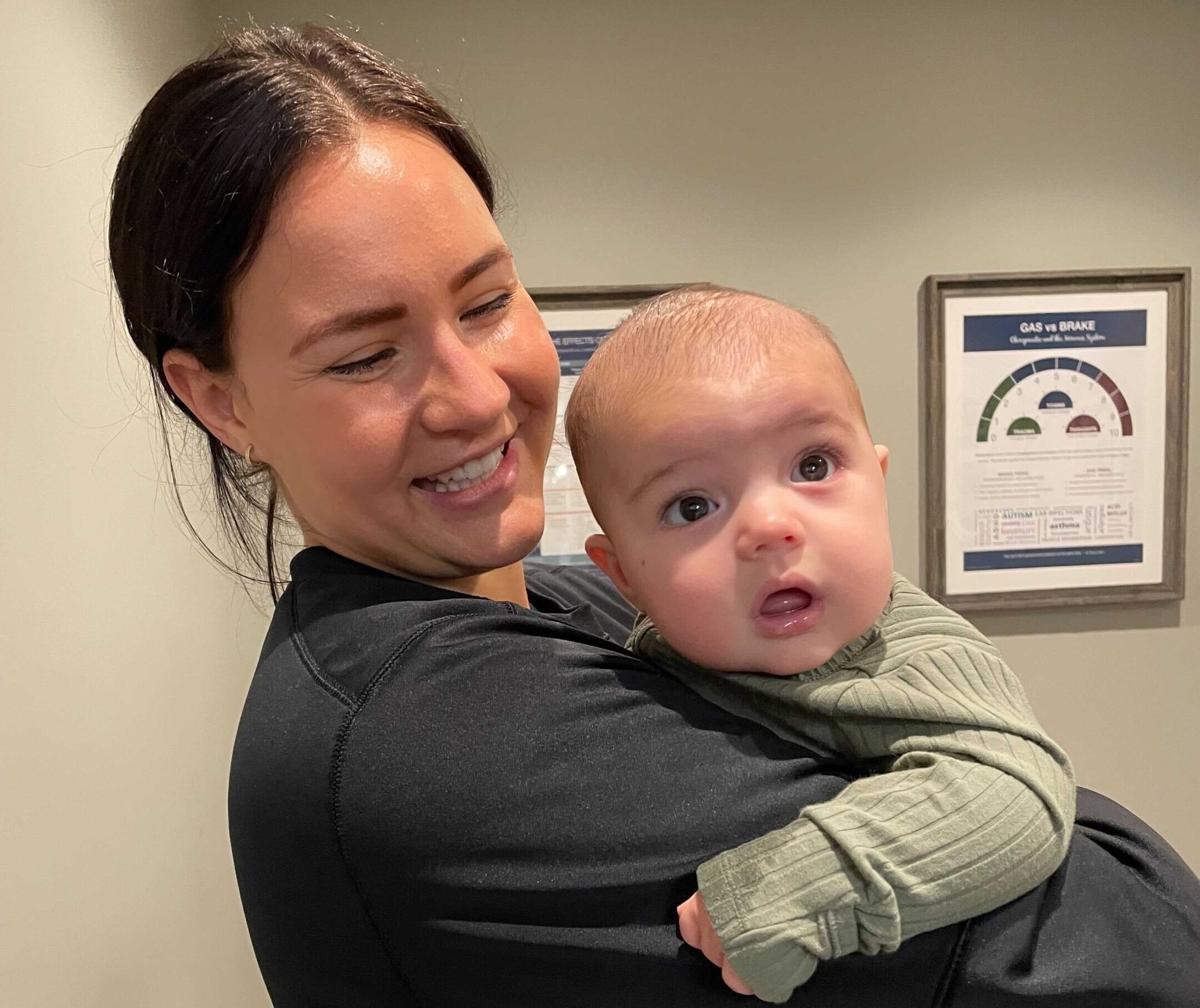Ask any new mom, and she’ll tell you her goals for her baby are pretty straightforward – make sure they are comfortable, eating well, sleeping well, and are able to get the nutrients they need to grow and develop properly.
But when onesies, bibs, and their mom’s shirts are consistently getting soaked with “spit up” after each feeding, it’s hard to feel like the development they are going through is common and normal.
Most parents have already asked similar questions to a pediatrician, or a friend or even turned to google to do their own research. Only to be overwhelmed with more questions internally, “Is it something I’m eating?” “Is it the formula?” “Am I not burping them enough?”
Some infants are given the term “happy spitters” with slight reflux symptoms, but far too often this is not the case and the reflux is accompanied by colic, sleep challenges, and straining and arching their back — all of which leads to a very fussy baby.
This was precisely where Colton’s mom was at. “We tried a handful of formulas, and none seemed to work, his reflux would get him so worked up, and we couldn’t get to sleep more than 2 hours at a time,” she said. “I felt frustrated and, at times, hopeless that there was nothing I could do to comfort him.”
What is Reflux in Babies?
Gastroesophageal reflux or GER can best be defined as an upward movement of the stomach content, including acid, into the esophagus and sometimes into or out of the mouth, most commonly happening after a meal. When this “little bit of spit up” increases in frequency and severity, and is associated with discomfort including colic and digestive challenges it is commonly referred to and diagnosed clinically as GERD (gastroesophageal reflux disease).
What are the Symptoms of Reflux in Babies?
There are many softer signs and symptoms that may indicate your infant struggles with reflux or GERD, including the list of challenges below:
- Spitting Up
- Arching of the back, often during or right after eating
- Colic – crying that lasts for more than 3 hours a day with no medical cause
- Gagging, hiccupping, or trouble swallowing while feeding
- Irritability, or being unsettled, especially after eating
- Poor eating or refusing to eat, accompanied by poor weight gain
- Forceful or frequent vomiting
What Are the Causes of Reflux in Babies?
While your pediatrician may blame some ‘malfunction’ in the structure of your baby’s digestive system, and some Google searches and Facebook Groups talk all about nutrition and eliminating dairy… to get the actual root cause for many kids, we’ve got to look even deeper into how their nervous system is growing and developing. In this article, we’ll go through each of the elements (structure, nutrition, and neurology) here.
Structurally, there is a muscle called the lower esophageal sphincter which acts as a valve between the esophagus and the stomach. When the baby swallows it relaxes to help food pass to the stomach, but it usually stays closed. If the lower esophageal sphincter isn’t fully developed or the brain signaling to it when swallowing/not swallowing isn’t in sync, it can stay open — letting contents of the stomach back up into the esophagus and mouth.
This can occur normally in infants as the esophageal sphincter muscle isn’t fully developed. But if reflux persists, neurological signals often go to the muscle that can cause it not to respond appropriately.
It may seem serious to label a struggle neurological, but when we dig into how babies develop and everything they need put together at the same time, it starts to make sense that if one signal is off it can create a cascade.
Here’s how it so amazingly works together. When babies learn to suck and swallow, their brain learns and combines a fantastic amount of information quickly. They have to balance steady breathing, pace the amount of breast milk or formula they are taking in, and position their neck, lips, mouth, and tongue muscles appropriately — all at the same time!
If all these various systems and their functions aren’t in sync, there could be another factor at play with a condition called dysautonomia. This simply means that the autonomic nervous system is having trouble keeping their eating, digesting, moving, and breathing all happening at the same time. When this is the case, babies will often struggle to eat comfortably and keep the food down easily since the nervous system will prioritize breathing and movement over digestion.
When we look deeper at the autonomic system, we find a vast amount of interconnected nerves that need to signal appropriately to help comfortable digestion work. If these interconnections in the nervous system misfire due to something called subluxation then swallowing, digestion, absorption, and comfortability in that region or system will be altered.
Our digestive system comprises nerves and muscles that work in coordination to move things along with ease. If the neurological control of the smooth muscles that make up the esophagus is interfered with, that leads us to understand that there is something more, or something different, at play – a neurological problem.
Lastly, we can see the reality of the neurological connections and correlations here by looking at the case histories of many older children who are suffering from neurodevelopmental challenges like sensory integration disorders and even autism. As you’ll learn in those two articles and throughout this site, the unfortunate reality is that while most pediatricians today still tell parents, “don’t worry, they’ll grow out of it,”… many do not.
Many children who have this distress, dysautonomia, and subluxation stay “stuck” in their system for years to come, leading them down the path of what PX Docs call The Perfect Storm.
How to Care For Babies with Infant Reflux
There are quite a few at-home practices that can help minimize the symptoms of reflux, but very few are care options that look to address the cause of the reflux struggle.
Some at-home practices often include:
- Burping baby more often
- Keeping baby in an upright position 30 minutes after feeding
- Changing the size of the nipple on their bottle
- Trying smaller, more frequent feedings
- If you use formula, talk to your doctor about sensitivities to the ingredients and do all you can to find more organic, chemical-free, easy-to-digest options (this link on Mama Natural’s site can help)
Most parents we meet in the clinical setting have tried most of the above tips. Still, they often only lessen the symptoms, and the neurological communication and connection remain the issue.
To truly address this, a PX Doc needs to learn the mom and baby’s story and then measure the stress on their system. This is first done by taking a thorough case history and really looking at all the stressors a child may have been exposed to early in life, as well as all the various treatments and care options a family has tried already. We frequently find things like birth trauma and intervention (C-section, forceps, vacuum extraction, induction, long labor times, etc.) and colic and indigestion in the early stages of the case history.
Then from there, the most important thing is to run a set of INSiGHT Subluxation Scans on the child to find exactly how that autonomic and central nervous system “control center” is functioning. Below is an example of the most common Insight Scan finding we see correlated with reflux and GERD in a baby.
What all the colors and back-and-forth tension on this INSiGHT Scan shows us is simply one thing — stress and subluxation are stuck deep in this child’s nervous system.
Once a PX Doc finds the root cause, we can help babies find relief. Our trained and experienced Pediatric Chiropractors can make gentle, safe, easy adjustments that unwind and release the stress and tension built up in your baby’s nervous system from pregnancy and birth. Not just minimizing the symptoms but putting the entire nervous system at ease.
This is precisely how it worked out for Colton. After Colton started seeing a Pediatric Chiropractor, just a few weeks into care, he was “reflux free, sleeping better and passing gas and stools without complaint.” Mom was no longer searching for the right formula or need to sacrifice sleep to feed him more frequently or keep him upright.
“He is always smiling!” says mom, “Honestly, he is a completely different baby from when we started. Colton often sleeps through the night, loves to play on his tummy, and rolls around. He laughs and enjoys everyone around him, and we absolutely enjoy him.”
Get Help Today- Schedule Your Consult and INSiGHT Scan
Our experienced pediatric doctors are trained not only to look at the uniqueness of infants and babies who struggle with reflux but also at the conditions that so often accompany reflux – lack of sleep, constipation, and colic. They know to look deeper into the function of the nervous system to address the root cause.
They’ll help you find the exact cause of your child’s challenge, immediately formulate a customized care plan just for your child, release that stress, and add ease, happiness, and sleep back into your life!
Your child was made to heal and be healthy. Don’t give up hope, just get a new direction by searching our PX Docs Directory today to find a trained and ready Pediatric Chiropractor near you!





